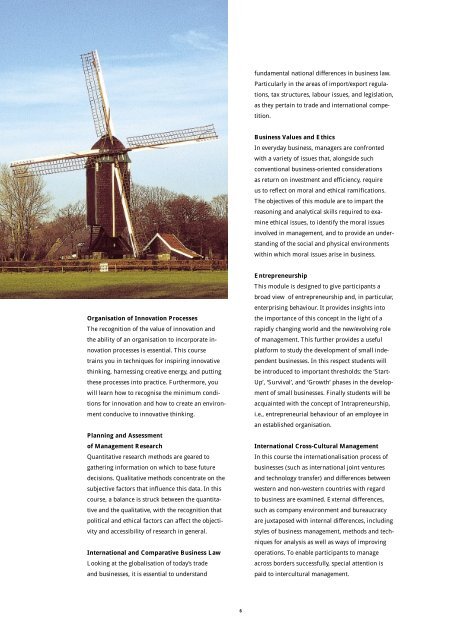3213 Brochure Int. Full-time 4 - WiWi-Online
3213 Brochure Int. Full-time 4 - WiWi-Online
3213 Brochure Int. Full-time 4 - WiWi-Online
You also want an ePaper? Increase the reach of your titles
YUMPU automatically turns print PDFs into web optimized ePapers that Google loves.
fundamental national differences in business law.<br />
Particularly in the areas of import/export regulations,<br />
tax structures, labour issues, and legislation,<br />
as they pertain to trade and international competition.<br />
Business Values and Ethics<br />
In everyday business, managers are confronted<br />
with a variety of issues that, alongside such<br />
conventional business-oriented considerations<br />
as return on investment and efficiency, require<br />
us to reflect on moral and ethical ramifications.<br />
The objectives of this module are to impart the<br />
reasoning and analytical skills required to examine<br />
ethical issues, to identify the moral issues<br />
involved in management, and to provide an understanding<br />
of the social and physical environments<br />
within which moral issues arise in business.<br />
Organisation of Innovation Processes<br />
The recognition of the value of innovation and<br />
the ability of an organisation to incorporate innovation<br />
processes is essential. This course<br />
trains you in techniques for inspiring innovative<br />
thinking, harnessing creative energy, and putting<br />
these processes into practice. Furthermore, you<br />
will learn how to recognise the minimum conditions<br />
for innovation and how to create an environment<br />
conducive to innovative thinking.<br />
Planning and Assessment<br />
of Management Research<br />
Quantitative research methods are geared to<br />
gathering information on which to base future<br />
decisions. Qualitative methods concentrate on the<br />
subjective factors that influence this data. In this<br />
course, a balance is struck between the quantitative<br />
and the qualitative, with the recognition that<br />
political and ethical factors can affect the objectivity<br />
and accessibility of research in general.<br />
<strong>Int</strong>ernational and Comparative Business Law<br />
Looking at the globalisation of today’s trade<br />
and businesses, it is essential to understand<br />
Entrepreneurship<br />
This module is designed to give participants a<br />
broad view of entrepreneurship and, in particular,<br />
enterprising behaviour. It provides insights into<br />
the importance of this concept in the light of a<br />
rapidly changing world and the new/evolving role<br />
of management. This further provides a useful<br />
platform to study the development of small independent<br />
businesses. In this respect students will<br />
be introduced to important thresholds: the ‘Start-<br />
Up’, ‘Survival’, and ‘Growth’ phases in the development<br />
of small businesses. Finally students will be<br />
acquainted with the concept of <strong>Int</strong>rapreneurship,<br />
i.e., entrepreneurial behaviour of an employee in<br />
an established organisation.<br />
<strong>Int</strong>ernational Cross-Cultural Management<br />
In this course the internationalisation process of<br />
businesses (such as international joint ventures<br />
and technology transfer) and differences between<br />
western and non-western countries with regard<br />
to business are examined. External differences,<br />
such as company environment and bureaucracy<br />
are juxtaposed with internal differences, including<br />
styles of business management, methods and techniques<br />
for analysis as well as ways of improving<br />
operations. To enable participants to manage<br />
across borders successfully, special attention is<br />
paid to intercultural management.<br />
6

















